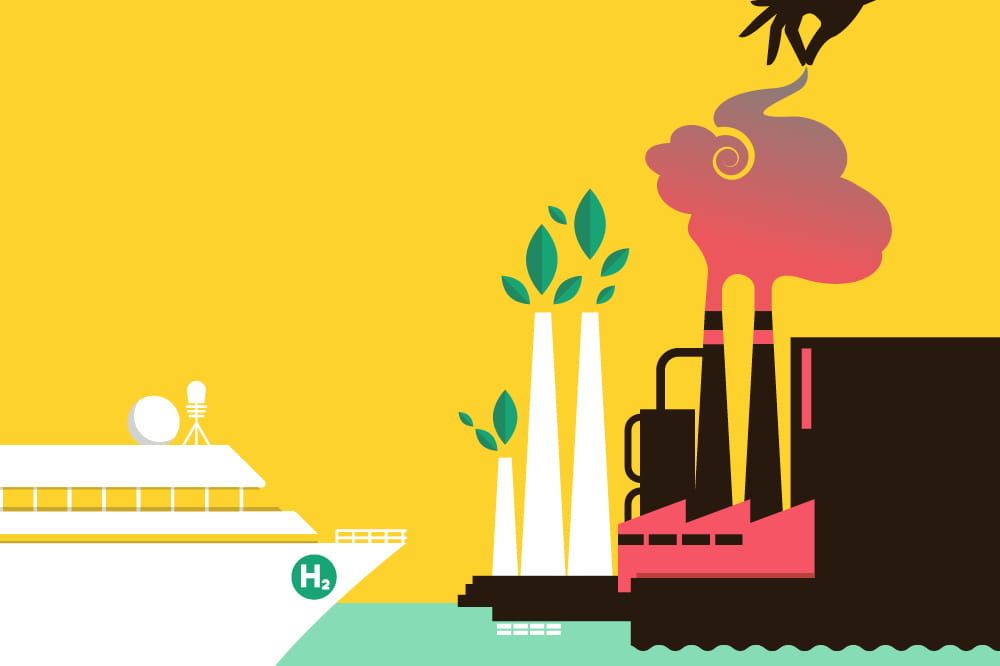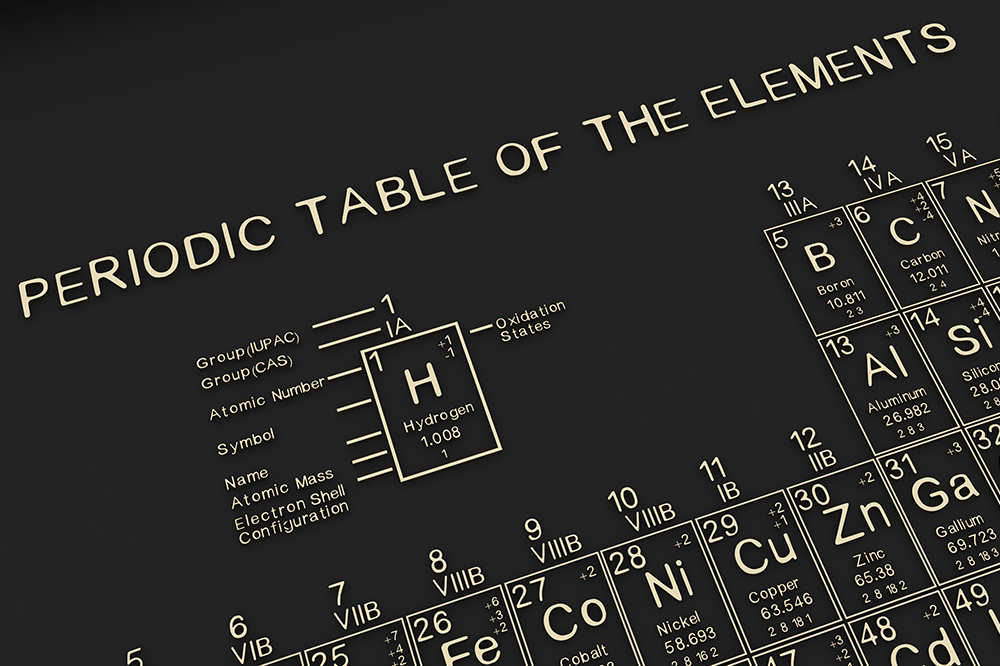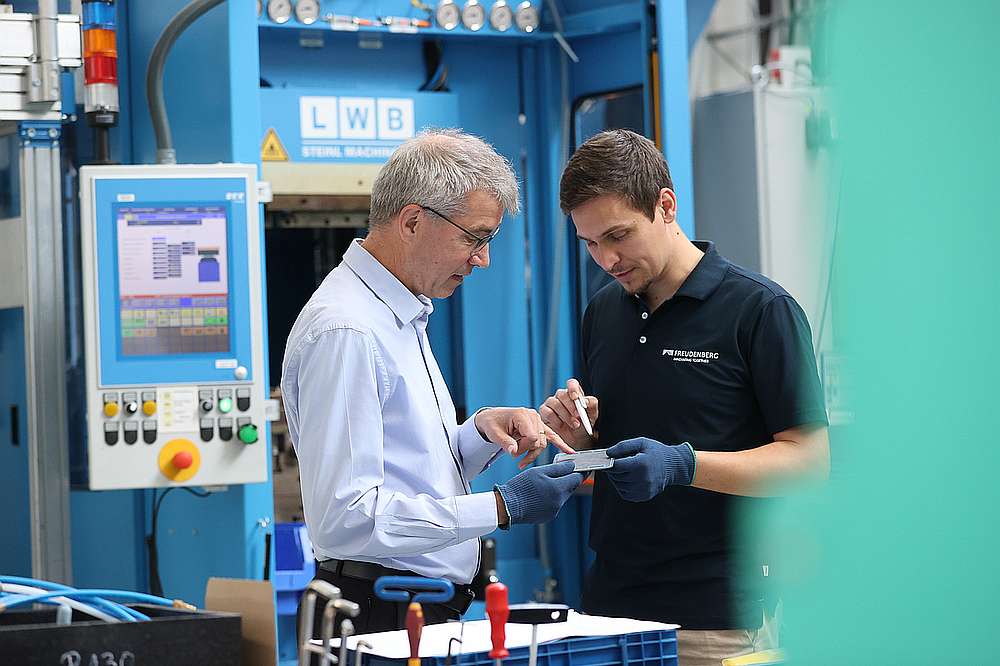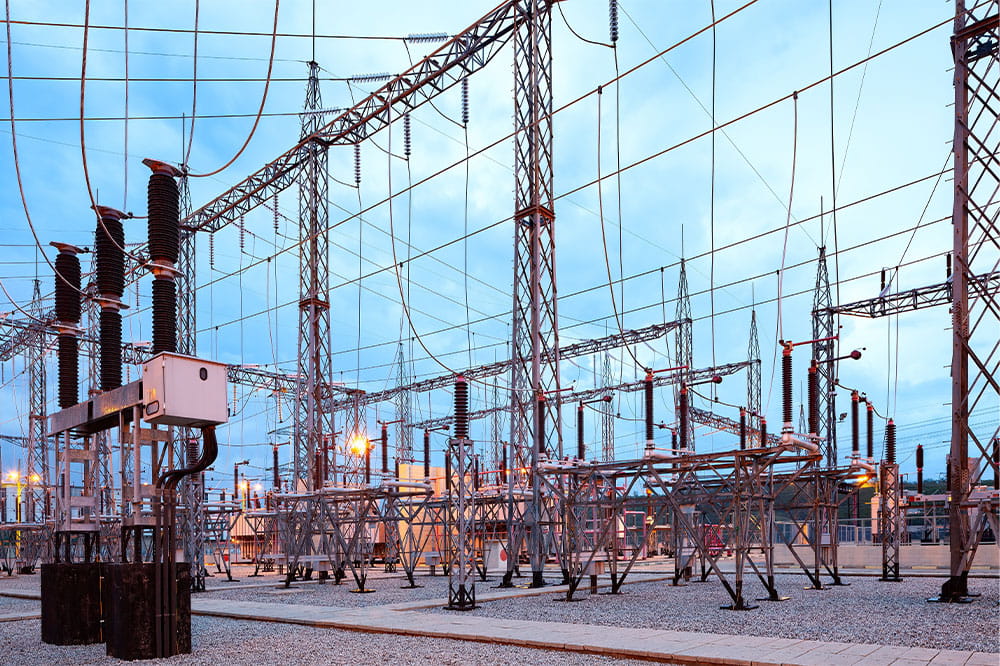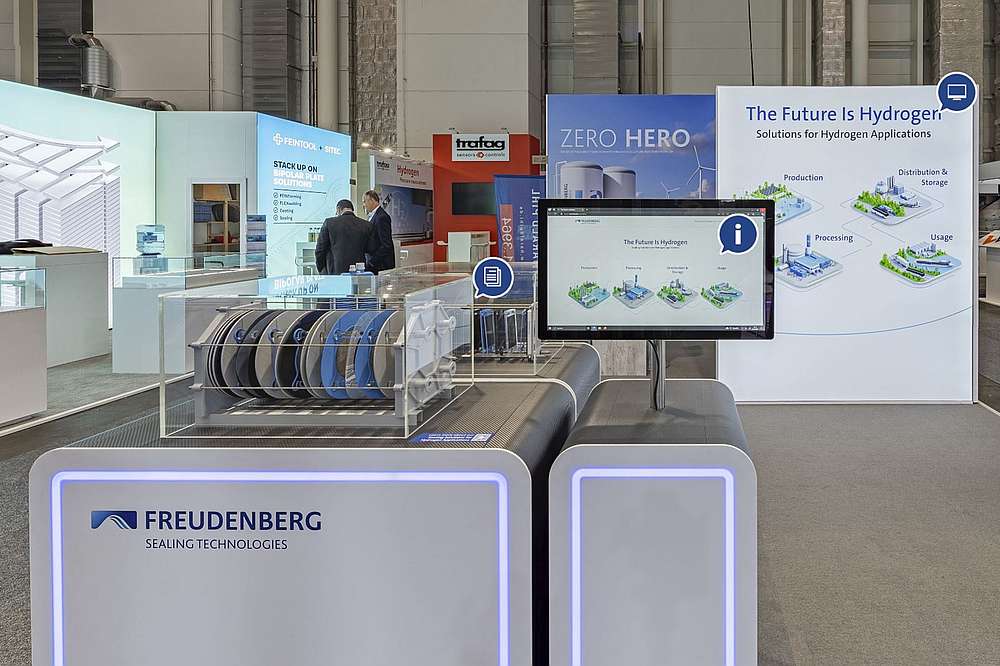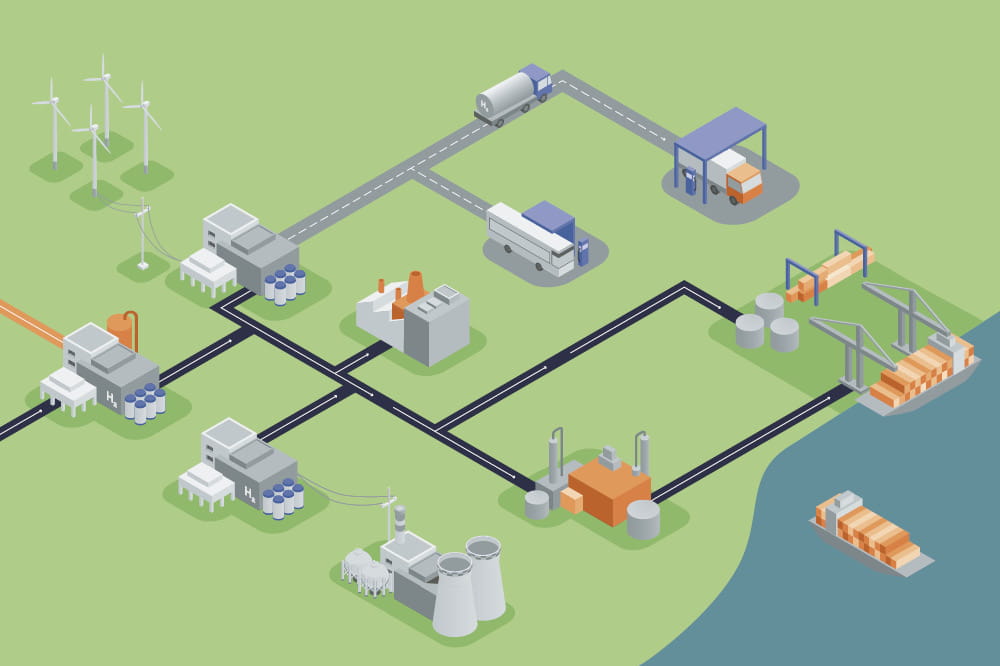Obtain news and background information about sealing technology, get in touch with innovative products – subscribe to the free e-mail newsletter.

22.07.2021 | Story
“The Energy Map Is Being Redrawn”
Political scientist Dr. Kirsten Westphal advises political decision-makers on issues relating to security and foreign policy. Her focus is currently on the energy transition. A conversation about inexhaustible resources and the growing importance of hydrogen.
Dr. Westphal, you have been dealing with the “geopolitics of the energy transition” since 2018. What is your area of interest?
Dr. Kirsten Westphal: My team and I investigate how the energy transition in Germany and the EU affects their external relations. It can generally be said that the energy transformation will have geopolitical effects. It is going to be a different world.
In what respect?
The countries that now import fossil resources are gaining greater power. The producers of fossil raw materials are relinquishing it. There is the prospect that Europe will get more room for maneuver, but it needs to answer a question: With whom does it intend to network on energy policy? In any case, the energy map is being redrawn.
Is the energy transition a regional issue? Or is it actually a global issue?
Germany and the EU are playing a pioneering role here. But the Paris climate agreement has shown that dealing with climate change is a global issue. More and more countries want to be climate-neutral by 2050 or at least CO2-neutral by 2060. The declarations are coming in quick succession. Everything sounds positive for now.
Dr. Kirsten Westphal

Dr. Kirsten Westphal is a political scientist who works for SWP, the German Institute for International and Security Affairs, in Berlin. SWP analyzes foreign policy issues for federal political leaders, economic entities and the public. At SWP, Dr. Westphal is responsible for international energy relationships and global energy security. She is also a member of the National Hydrogen Council. In addition, she was on the panel of experts of the Global Commission on the Geopolitics of Energy Transformation 2018-19 and collaborated on the commission report “A New World.”
There is a “but” somewhere in your statement.
Climate politics is not energy politics. While declarations are important, measures must follow. The absolute supremacy of climate politics poses problems, especially when real progress on the energy transition lags and ambitions are spiraling faster and faster. This poses the risk of losing credibility at some point.
Still, the early indications seem to be positive for an energy transition.
Absolutely. We are seeing global momentum, not least of all because the costs of renewable energy have fallen sharply. This makes it an attractive option. It makes economic sense practically everywhere. From a global standpoint, the energy transformation is moving ahead very differently across the globe – the goals and the routes to the conversion are frequently different than those in Europe.
What are the energy transition’s drivers?
Besides reducing costs, it is public opinion. The public sees climate change as a threat. It is tangible in many places. For example, the air pollution that causes major problems locally.
So the resources issue is less important?
This is an exciting aspect. The focus was once on the finite character of oil and gas. We believed that extraction would soon reach its high point. The assumption became almost baseless with fracking, the revolution in the extraction of shale oil and gas. We now know there is more there than we thought. The actual scarcity is in the atmosphere. How much CO2 may we load into the air if we want to stay with the two-degree goal?
So raw materials in the ground won’t run out, but there have been and still are countries that have less of them. Has this circumstance led them to find innovative solutions?
That’s clear. The high level of energy efficiency in countries such as Japan and Germany shows this. Any country spending a large portion of its gross domestic product importing raw materials behaves differently than that who have substantial deposits of these resources. Countries poor in raw materials are also forced to diversify in terms of countries of origin and supply routes. The concentration of energy riches will change as the energy transition continues. Renewable energy along with generated hydrogen will be more evenly spread around the world than oil and gas are.
The countries exporting fossil raw materials should be involved in this. Have they tended to stick with their resources and innovate less?
They can’t all be lumped together. Consider the United States, Canada or Norway. They are all resource-rich and innovative at the same time. Much would depend on how liberal the political system is. On the other hand, state-owned enterprises carry considerable weight in an economy. They are not under nearly the same pressure to innovate as multinational corporations.
You mentioned hydrogen. The capacity to innovate is in high demand for its production.
That’s right. With an energy transition, economic value is no longer created with resources, but rather through the use of technology. As a result, an economic system’s capacity to innovate is a crucial factor. Here, Asia and especially China are worth noting, all the more since the size of a market plays a major role when new technologies are introduced. It was significant for the battery revolution and e-mobility. China’s economies of scale are enormous.
What does that mean for Europe?
China has caught up with us in batteries, solar panels and high-voltage, direct-current transmission lines. Will the EU succeed in avoiding this situation when it comes to hydrogen and will we manage to export these technologies as well? China is pursuing the strategies “Made in China 2025” and “Standards 2035.” China clearly wants to advance key technologies such as hydrogen and set the standards for them. And then there are the structural asymmetries. We have highly innovative small and medium-sized companies supported by foreign trade chambers and embassies. But in Africa, for example, they have to compete with China’s state-owned companies offering low-cost system solutions and loans as a package. The EU must continue to be vigilant in this area. Competition from China has to be taken seriously, especially when it is exporting its economic model as well.
With an energy transition, economic value is no longer created with resources but with the use of technology.
The EU is striving for green hydrogen produced from renewable energy. What are the premises for it?
I believe it is essential for us to develop the technology and create facilities for it to give Europe the ability to export and to keep it competitive and innovative. But realism is in order. The EU is limited when it comes to good locations for solar and wind energy and generally available space. In this sense, it is plausible or even essential to rely on imports and carry out hydrogen projects abroad with partners. Here I am initially thinking of Europe’s periphery and the countries connected by pipelines. Norway and Britain are close to us by any measure. Geographically and politically, they are part of a European rule and market area and are pressing ahead with climate protection. Of course, hydrogen should also be sourced from other regions.
What is your conviction based on?
Germany and the EU have to provide mutual economic interconnections to achieve stability and prosperity in neighboring regions. Imports of hydrogen and its derivatives offer countries like Russia, the Persian Gulf states or even Algeria and Egypt the opportunity to keep earning money. As Europeans, we are unable to create an exclusive island of happiness when our neighborhood is not benefiting as well. Such geopolitical considerations must be taken into account.
Hydrogen Valleys: Hydrogen as an energy carrier could decarbonize port cities with their industries and logistics centers.
How will the United States position itself in terms of energy policy?
It has heavily focused on fracking and fossil fuels recently. That will change under the new U.S. President, Joe Biden. He is stressing climate protection, and the new Vice President, Kamala Harris, is one of the signers of the Green New Deal. That’s why I expect the new administration to move ahead with the expansion of renewable energy and key technologies such as hydrogen. But its energy and technology policies will focus heavily on the country’s own industries and employment. The country will collaborate more multilaterally on climate, but “America First” will still guide its actions in economy. Not least of all due to its rivalry with China.
How important is the interplay of the government and business for a national hydrogen agenda?
Very important. Three approaches have to work in parallel: The technology has to be ready for market, you have to be able to foresee the business case, and the political conditions have to be right. It won’t come together without this parallel interplay. Otherwise, the old chicken-or-egg problem will continue. Supply and demand must be triggered. We need new, clear framework conditions and, most likely in the initial phase, non-market-based tools, even if the goal must be to create a hydrogen market. Since it is essential to introduce new sources of energy and technologies this touches on the issues related to EU subsidies. The policies are crucial. They determine whether projects will pay off.
What is industry’s readiness to turn to hydrogen as an energy source?
We now experience a real hype about hydrogen. This is not the first time, but now it’s different since it has seized the imagination of numerous countries and industries. An energy system that doesn’t include the use of hydrogen would be inconceivable in 2050. In addition, financial institutions are starting to get out of fossil resources. They tend to see hydrogen-related projects and the associated infrastructure programs as attractive measures.
What industries are showing a special interest in hydrogen?
I think it is being discussed in every industry. It already plays a role in refineries. There are pilot projects in the steel industry. Plus cement, aluminum, glass. If you think further ahead, there is heavy-duty transport and aviation.
An energy system that doesn't include the use of hydrogen would be inconceivable in 2050.
How could a breakthrough for hydrogen take place?
Hydrogen valleys, places where industries and logistics centers come together and network, seem promising to me. Take port cities, for instance. Antwerp produces about 15 percent of Belgium’s CO2 emissions, Rotterdam about 20 percent in the Netherlands. If these types of centers are de-carbonized with the help of hydrogen, much will have been gained.
Have the oil exporting countries such as those in the Persian Gulf begun to rethink their strategies and set their sights on hydrogen production?
Oh yes. They are further along than we have thought. Saudi Arabia is pursuing its Vision 2030 program to diversify its economy. This includes Project Neom, a new city the size of Belgium with desalinization facilities and green hydrogen production, encompassing the entire value creation chain that is due to take shape. When Saudi Arabia held the G20 presidency in 2020, it actively advocated a circular CO2 economy. The country is pursuing “direct air capture,” that is, extracting CO2 from ambient air, storing it and creating synthetic fuels from it.
Europe is thinking in terms of green hydrogen. Japan is initially betting on the import of hydrogen extracted from coal. Where is the world headed?
The world is very multicolored in this respect. It will be exciting to see how open the EU will be to hydrogen being produced in different ways, how it will certify the fuel and build up commerce in it. This isn’t just important with regard to the Gulf States – the issue involves Russia as well. That country is tackling a wide variety of production methods. So is the United States.
Let’s look into the future: What role will hydrogen play at the end of this decade?
I already hope that we in the EU will have achieved major progress in offshore wind parks and water electrolysis, which are key technologies. We have geographic advantages in these areas. In the western portion of the continent, the backbone infrastructure will have made a great deal of progress. Energy-intensive sectors will use hydrogen. At the same time, I think that we will discuss a number of issues more intensively and openly: the colors of hydrogen, its role in the heating sector, and above all its system function that hydrogen can provide as a storage medium for energy systems. Japan, the United States and China will all be using every form of hydrogen very pragmatically and will be geared to rapid industrial progress.
This article originally appeared in ESSENTIAL, Freudenberg Sealing Technologies’ corporate magazine that covers trends, industries and new ideas.
More news on the subject Sustainability

Join Us!
Experience Freudenberg Sealing Technologies, its products and service offerings in text and videos, network with colleagues and stakeholders, and make valuable business contacts.
Connect on LinkedIn! open_in_new

